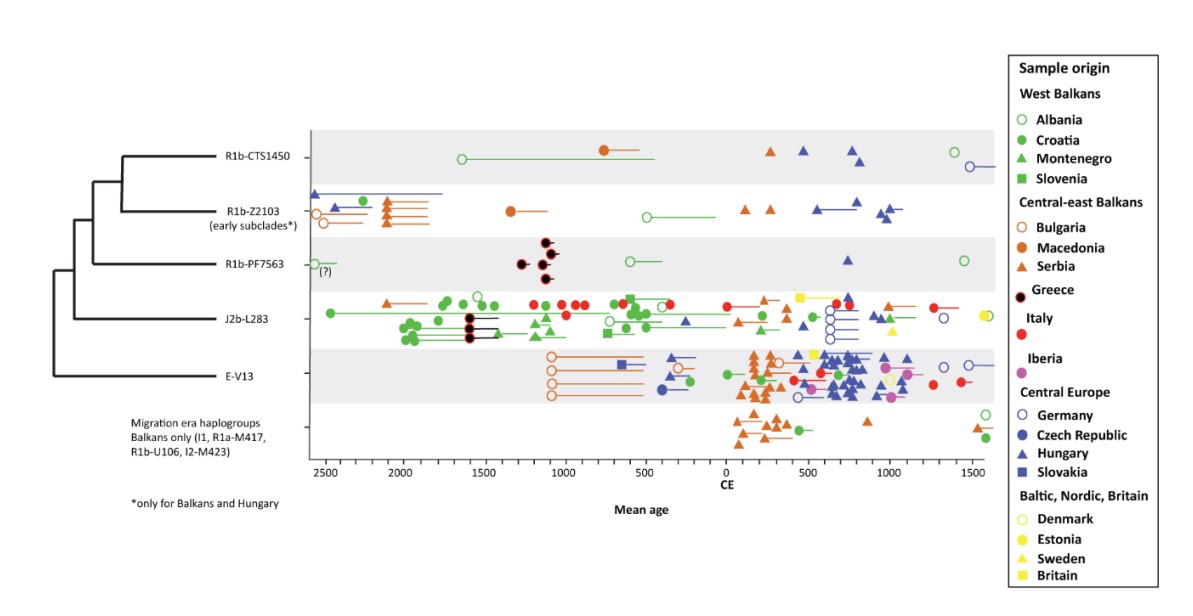Johane Derite
Regular Member
- Messages
- 1,851
- Reaction score
- 886
- Points
- 113
- Y-DNA haplogroup
- E-V13>Z5018>FGC33625
- mtDNA haplogroup
- U1a1a
"Ancient DNA reveals the origins of the Albanians"
Big new paper. Think it should have a dedicated thread.
LINK:
https://www.biorxiv.org/content/10.1101/2023.06.05.543790v1
Conclusions:
"However, in agreement with linguistic studies, we find that Albanians likely descend from a surviving West palaeo-Balkan population that experienced significant demographic increase approximately between 500-800 CE, perhaps after a population bottleneck. We show that in contrast to the rest of the Balkans, the Medieval samples from both North and South Albania experienced little to no contribution from surrounding Slavic populations and maintained high levels of BA-IA West Balkan ancestry. Remarkably, the same genetic profile persisted 500-800 years later in most of the post-Medieval samples from Bardhoc, as shown both by the PCA, qpAdm analyses, and IBD data, which indicate significant genetic continuity from the Medieval populations of Albania. However, qpAdm models cannot exclude the possibility of additional admixture with currently unsampled neighbouring late Roman-early Medieval palaeo-Balkan groups with a similar ancestry profile. Based on linguistic data, the area of modern Kosovo and southeastern Serbia may have been such a source.
Despite being largely unaffected by the demographic changes that took place during the Migration period, the historical Albanians did not emerge in isolation. At the peak of the Migration Period, the Medieval population of Albania displayed genetic links as far as Pannonia... Furthermore, two of the post-Medieval samples exhibit significant admixture with South Slavic populations, and modern Albanians display highly variable levels of Slavic ancestry. This indicates complex historical interactions with South Slavic populations, as suggested by toponymy and linguistics."
Big new paper. Think it should have a dedicated thread.
LINK:
https://www.biorxiv.org/content/10.1101/2023.06.05.543790v1
Conclusions:
"However, in agreement with linguistic studies, we find that Albanians likely descend from a surviving West palaeo-Balkan population that experienced significant demographic increase approximately between 500-800 CE, perhaps after a population bottleneck. We show that in contrast to the rest of the Balkans, the Medieval samples from both North and South Albania experienced little to no contribution from surrounding Slavic populations and maintained high levels of BA-IA West Balkan ancestry. Remarkably, the same genetic profile persisted 500-800 years later in most of the post-Medieval samples from Bardhoc, as shown both by the PCA, qpAdm analyses, and IBD data, which indicate significant genetic continuity from the Medieval populations of Albania. However, qpAdm models cannot exclude the possibility of additional admixture with currently unsampled neighbouring late Roman-early Medieval palaeo-Balkan groups with a similar ancestry profile. Based on linguistic data, the area of modern Kosovo and southeastern Serbia may have been such a source.
Despite being largely unaffected by the demographic changes that took place during the Migration period, the historical Albanians did not emerge in isolation. At the peak of the Migration Period, the Medieval population of Albania displayed genetic links as far as Pannonia... Furthermore, two of the post-Medieval samples exhibit significant admixture with South Slavic populations, and modern Albanians display highly variable levels of Slavic ancestry. This indicates complex historical interactions with South Slavic populations, as suggested by toponymy and linguistics."



